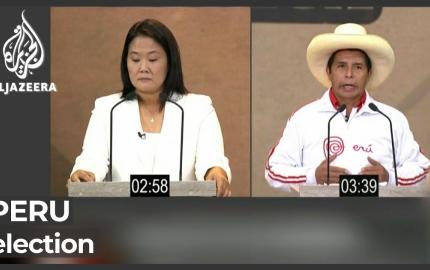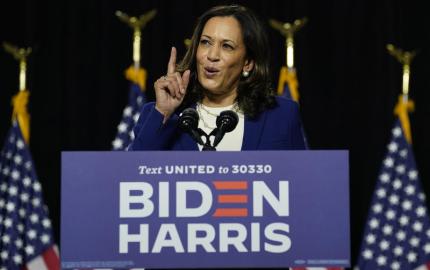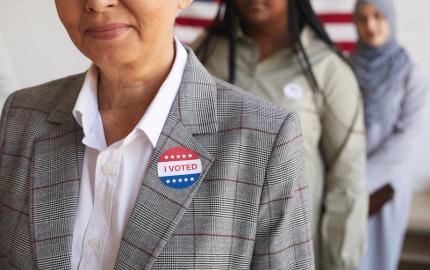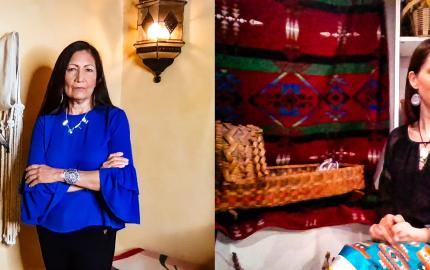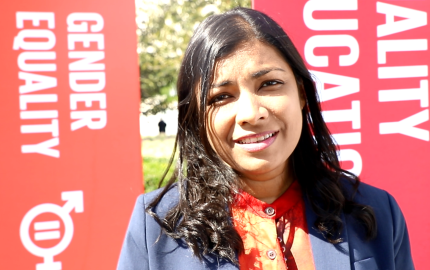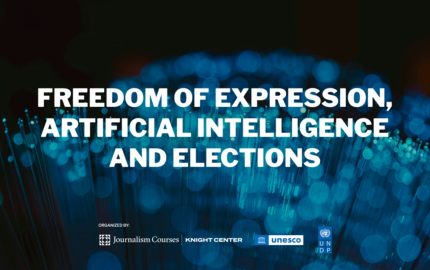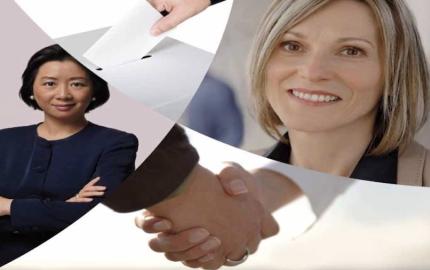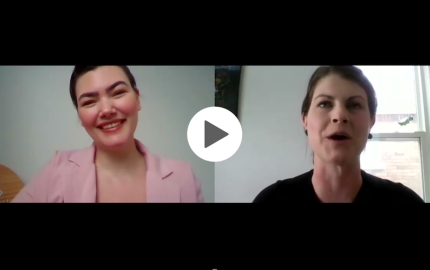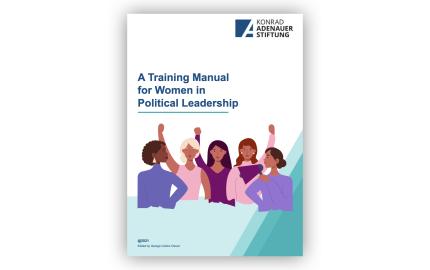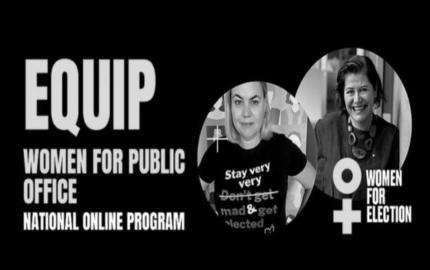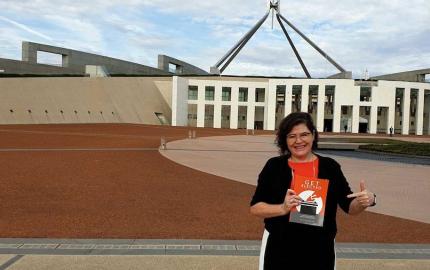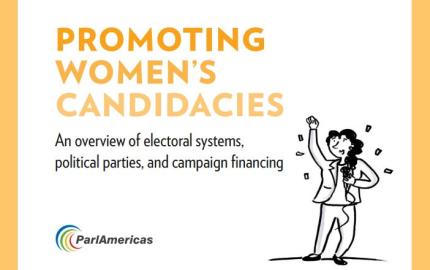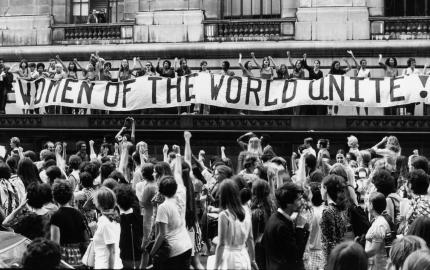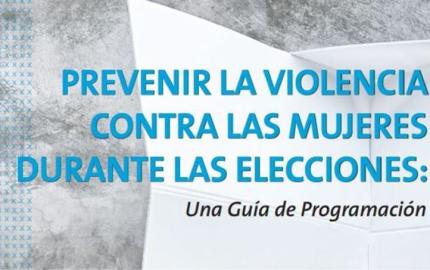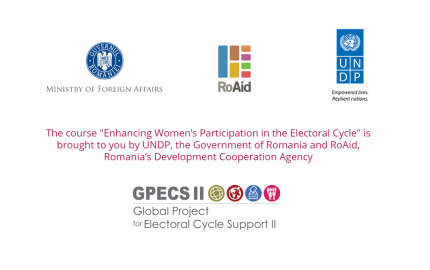Elections
Main navigation
Candidates in Peru's polarised presidential race have squared off in a televised debate - a week ahead of the runoff vote. Opponents of Pedro Castillo say his socialist policies will hurt the economy. Critics of conservative contender Keiko Fujimori associate her with corruption - from the time her father was president. Al Jazeera's Marina Sanchez reports from Lima.
Source: Aljazeera English
The historic victory of Vice President-elect Kamala Harris has underscored the expanding opportunities for women in politics, from running to office to helping others run.
The 2020 election inspired record numbers of voters to cast their ballots despite the turbulence and danger posed by the pandemic.
Click here to listen the podcast.
In this election, women made up an important voting bloc and the door is slowly opening as more women run for office. To talk about the influence of women in politics, KUNR’s Natalie Van Hoozer spoke to Dr. Christina Ladam, a political science professor at the University of Nevada, Reno. They also discussed how the current pandemic may or may not have affected women voters in this election.
Natalie Van Hoozer: Generally speaking, in terms of U.S. elections, how has the role or importance of the female voter evolved in recent years?
Dr. Christina Ladam: Where we're at right now, women vote at higher rates than men. Even though they've only been really involved in the voting and political process for a hundred years, much less than men, they're pretty influential in the political process now. We've seen that over the past five years or so, increasing numbers of women... the Women's March, and issues that women care about coming to the forefront.
Van Hoozer: Are you able to contextualize women's role in politics and as voters in Nevada with Nevada's political history?
Click here to read the full interview.
A report from the Center for American Women and Politics states that, in 2020, 18 Native American women—nine Democrats and nine Republicans—will have run as congressional candidates. This is the largest number of Native American women who have run—overall and in both parties—in a single election cycle. Some of these candidates were defeated in the primaries, but even so it’s still been a trailblazing year for Indigenous representation in a space that pays too little attention to issues impacting Indigenous communities, especially during COVID-19.
This is particularly noteworthy considering that there were no Indigenous women in Congress before 2018. The two Indigenous women who made history when they were elected to Congress two years ago, New Mexico’s Deb Haaland (Laguna Pueblo) and Kansas’s Sharice Davids (Ho-Chunk), are both running for a second term this year. In addition to these two incumbents, a handful of additional Indigenous women are running for national office. Even on the state level, there has been a notable presence of Indigenous women. Stephanie Byers, who is Chickasaw, is a Democrat running for election to the Kansas House of Representatives to represent District 86; should she be elected, Byers would be the first openly transgender woman in the state’s legislature. Christina Haswood, who is Diné, is also running for election to the Kansas House of Representatives, to represent District 10; at 26, she would be the state’s youngest sitting legislator.
To recognize and celebrate the diversity of Indigenous voices running in this election, Vogueasked now veteran Haaland to converse with newcomer Tricia Zunker in an exclusive new conversation. Zunker is a first-time candidate for the U.S. House in a critical state: She is hoping to represent Wisconsin’s 7th Congressional District. (She’s also a member of the state’s Wausau School District school board.) She hopes to bring Indigenous representation to Wisconsin, which has historically been a swing state but leaned Republican and elected Trump in 2016. “There are 11 federally recognized tribes here in Wisconsin, and the majority of them are in this large congressional district,” Zunker tells Vogue.“Representation matters.”
Click here to read the full interview by Vogue on 24 October 2020.
Rozaina Adam is a Member of Parliament from The Maldives.
This interview was conducted in September 2019 in the margins of the 74th session of the UN General Assembly (UNGA 74) in New York.
The infographics are produced by the Central Electoral Commission of Moldova, with the support of “Enhancing democracy in Moldova through inclusive and transparent elections” Project, implemented by the United Nations Development Programme (UNDP Moldova) with the financial support of the United States Agency for International Development (USAID), the British Embassy in Chisinau through the Good Governance Fund and the Embassy of Netherlands through the Matra Program.
Click here to see the infographics.
Welcome to the Knight Center’s new free online course, “Freedom of Expression, Artificial Intelligence and Elections,” organized by the Knight Center for Journalism in the Americas, in collaboration with UNESCO, UNDP, and with support of the Electoral Assistance Division (EAD) of the Department of Political and Peacebuilding Affairs (DPPA).
During this four-week massive open online course, which will be held during the month of April 2024, students will learn and explore the fascinating and ever-evolving world of technology and democracy, in particular on the impact of Artificial Intelligence on freedom of expression in elections.
To register for the course please follow these steps:
- Create an account in the Journalism Courses system. Even if you’ve taken a course with us before, you may need to create a new account. Check to see if your previous username and password work before creating a new account.
- Wait for a confirmation in your email indicating that your account has been created. If you do not receive this, please check your spam folder.
- Once your account is created and confirmed, please click on the following link to enroll: https://www.kccourses.org/enrol/index.php?id=121.
- Click “Enroll” to enroll yourself in the course. You will be able to access the course from the “My Courses” menu at the top of the page.
- Upon completing your enrollment, you will gain immediate access to the course and receive a confirmation email as well.
Who can enroll?
- Electoral practitioners and regulators.
- Journalists and media professionals.
- Civil society organizations working on elections, human rights, and gender equality.
- Students and educators.
- Voters and citizens interested in understanding AI and its impact on democracy.
To register for the course, click here.
In order to promote women’s role in municipal politics, FCM has created a Standing Committee on Increasing Women’s Participation in Municipal Government. One of the tools this Committee has created to encourage and support more women in municipal government—including elected office—is this guide to municipal elections for women candidates.
This guide is designed to be a resource for women and for men who wish to promote the role of women in municipal politics. When reading this guide, remember that there is no single way to conduct election campaigns. In addition, this guide is by no means exhaustive. Municipal election policies and regulations vary by province and territory. This guide presents three appendices for those who have additional questions, or who would like clarification of the rules that apply in their own municipalities.
Click here to access the report.
An interview featuring Kate (Oxford) talking with Alyssa Humphrey from the Social Factory.
About Alyssa | Alyssa is a brand developer and digital media marketer located in Woodstock, Ontario with nine years of professional social media management, brand development and web design experience. Between her time in the agency world, coordinating projects, developing strategies, and cultivating brands, to working in-house for corporations and tech firms, Alyssa offers a truly holistic experience for those looking to develop and grow their online presence. An early adopter of social media for business, Alyssa uses this unique perspective to deliberately and tactfully guide her clients into the spotlight through social media strategy and management, content development, and website design. As a passionate advocate for small, local businesses, the majority of Alyssa’s client roster is made up of entrepreneurs looking to turn their small biz into a brand, rebrand an existing business or transition from brick and mortar to e-commerce. She was one of the pillars of SupportingOxford.ca and has been nominated for two Business Excellence Awards through the Woodstock Chamber of Commerce. Learn more at TheSocialFactory.ca
Click here to access the video.
KAS consolidated a training manual that would be used to conduct a long-term tailored engagement on selected aspiring women politicians on effective campaign strategies leading up to elections. The training manual thus seeks to strengthen the capacities of women politicians on various strategic skills on campaigning for elective positions. The publication is available in English and German.
Click here to download the report.
The Women for Election EQUIP program is Australia’s first non-partisan, online political campaign workshop. It is designed to provide in-depth, practical training for female candidates and female campaign managers in advance of Local, State and/or Federal elections in a cross-party environment.
Click here to learn more.
Disillusioned with politicians and frustrated with politics in general? Stop complaining. Be the change you wish to see. Run for office and Get Elected!
Ruth McGowan OAM has worked as a consultant and adviser to councils, peak bodies in local government and community leaders since 2012. She is a former Mayor of Baw Baw Shire Council and an alum of the University of Melbourne’s Pathways to Politics Program for Women.
Get Elected is Ruth’s step-by-step campaign guide to winning public office: local, state, and federal. Written primarily for women, Ruth wants to see gender parity in Australian councils, state and territory parliaments and federal politics. Get Elected explains how women candidates and their supporters can plan and deliver a winning campaign.
Click here to learn more.
In line with its commitment to strengthening democracy and governance in the Americas and the Caribbean, ParlAmericas carries out activities related to electoral processes and women’s political participation. With these objectives in mind, parliamentarians have joined delegations accompanying and observing elections in Haiti and in the United States. These missions applied gender perspectives in their work, examining the equality between men and women in exercising their political rights, with particular attention to the conditions for the participation of women candidates and voters.
In addition, ParlAmericas held a regional gathering, The Electoral Journey of Women Candidates (in Spanish), in Guatemala in September 2016. At this gathering, current and former parliamentarians and political leaders from Central America, along with experts and representatives from the Department of Electoral Cooperation and Observation (DECO) and the Inter-American Commission of Women (CIM, by its Spanish initials) of the Organization of American States (OAS), identified the main obstacles women candidates face throughout the electoral cycle and proposed legislative reforms to establish equitable conditions in electoral processes.
Click here to see the training guide.
Since Hillary Clinton’s devastating loss in the 2016 election, there has been a renewed interest for women in politics and women running for politics. Emily’s List reported in March that over then thousand women reached out to them about running for office, a number bigger than the number of women who reached out during the entire 2016 election cycle, from January 2015 to November 2016. And Emily’s List is just one of many organizations out there that is helping women run for office. Below are eight institutions helping create a world with a more equal representation of the genders in office.
The name of this organization is actually an acronym for “Early Money Is Like Yeast” (i.e., it makes the dough rise). Their reasoning behind this unique name is that it’s a reference to a convention of political fundraising that receiving major donations early in a race is helpful in attracting other, later donors.
Emily’s List helps Democratic women run for office by recruiting women and building winning campaigns at every level of government. Since their founding in 1985, they have helped elect twelve governors, twenty-three senators, one hundred and sixteen House representatives and over eight hundred women to state and local office. Emily’s List also hosts candidate trainings for women who want to run for office and conducts research about women’s political views and voting behaviors.
She Should Run is a relatively newer organization that helps women run for office. Founded in 2011, the organization has inspired over fifteen thousand women to run for office since the 2016 election. She Should Run has also launched an initiative called #250Kby2030 that strives to get two hundred and fifty thousand women to run for office by 2030.
She Should Run accepts women of all political ideologies, ethnicities and backgrounds. Through its Ask a Woman to Run tool, people can let She Should Run know about great women leaders who they think should run for office. She Should Run also has an Incubator that offers online resources for women and goes to cities for in-person and virtual sessions, Chicago being the next city it’ll be in.
Click here to access the full list published by Study Breaks.
The publication “Preventing violence against women in elections: A programming guide”, jointly produced by UN Women and UNDP, brings to light the scourge of violence against women in elections.
It seeks to identify the specific components of violence against women in elections, including types, tactics, victims and perpetrators, and presents options for policy and programming responses based on current good practices. It also provides examples of definitions and methods from all regions that may prompt ideas for actions according to each country’s national context.
This guide is intended for those best positioned to prevent and mitigate violence against women in elections, including national electoral stakeholders, international organizations such as UNDP, UN Women and other UN agencies, as well as those providing programming support on electoral assistance, women’s political participation, human rights monitoring and ending violence against women. It will also be a resource for members and especially leaders of political parties, electoral management bodies, civil society organizations, women’s groups and gender equality activists.
Source: UN Women
Promoting the equal political participation of women is a key aspect of achieving inclusive and sustainable human development and achieving the targets set in the 2030 Agenda.
The e-learning course ‘Enhancing Women’s Political Participation Throughout the Electoral Cycle’ covers the three phases of the electoral cycle, as well as internal EMB structures and highlights entry points to boost women’s participation in different roles. During the course, the user is provided with a detailed overview of the existing policy and human rights framework, relevant publications and other knowledge tools.
The target audience of the e-learning course are men and women working in electoral administration, candidates, political party members, but also assistance providers and members of civil society organizations.
Click here to take the course.
